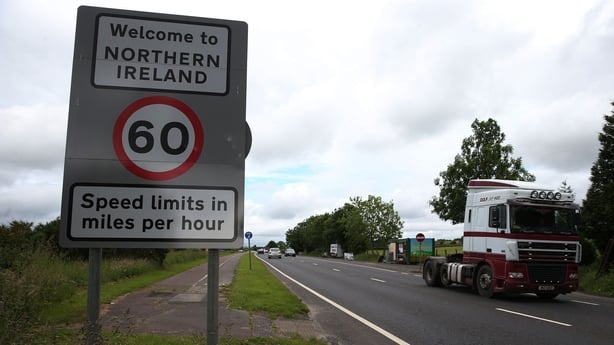The Government has published its strategy for the negotiations between the European Union and the UK on Britain's exit from the bloc, which includes exploring EU measures which may assist Ireland in ameliorating the effects of Brexit on specific Irish businesses and economic sectors.
The strategy observes that discussions are under way with the European Investment Bank on the potential for increased investment in Ireland to back the Government's ten-year capital plan.
The Government emphasises its priorities as the peace process and Good Friday Agreement, maintaining the Common Travel Area and minimising the risks to Ireland's trade and economy, and no return to a hard border.
It also stresses the rights of Irish citizens residing in the North to continue to enjoy their rights as EU citizens.
Brexit presents critical risks for key sectors that operate on an all-Ireland basis including food, retail, tourism, fishing and energy, it says.
Minister for Foreign Affairs Charlie Flanagan has said that Ireland's unique concerns have been identified, appreciated and recognised.
Speaking on RTÉ's Six One News, Mr Flanagan said the Government needs to ensure that the existing arrangements Ireland has with the UK are factored into the EU's final position.
Charlie Flanagan: 'We need to ensure that the existing arrangements that we have with the UK are factored in to the final position.' pic.twitter.com/2T7NGuauJi
— RTÉ News (@rtenews) May 2, 2017
Today's document shows that Ireland is "ready for the task" over a wide range of issues, he said.
He said: "What we need to ensure is that the existing arrangements that we have with the UK are factored into the final position. It's too early to say about new regulation and about new relationships."
"What I can say is that our unique circumstances on the island of Ireland have been factored in at this stage.
"What we need to ensure now is that continues right throughout what is going to be a very difficult and challenging process."
The document states that any restrictions on trade will have profound impacts on all-island relations and on the economy across the island and consequently for the peace process.
With 30,000 border crossing each day for work and study and very many other for personal journeys, it says, the impact of a hard border cannot be understated.

Given that the EU's initial negotiating position is now clear, it says, the Government will intensify its focus on the economic implications of Brexit.
That includes domestic policy measures to reinforce the competitiveness of the Irish economy, to protect it from potential negative impacts of Brexit, and to pursue all possible opportunities that might arise.
Since 1973, it notes, Ireland has been a significant net financial beneficiary of the EU to the tune of approx €42 billion and it is expected that Ireland will become a larger net contributor in the coming years.
May promises to be 'bloody difficult woman' in Brexit talks
It strategy document lists a five-pronged approach:
- To prudently manage the economy and public finances to meet future challenges,
- negotiate with the remaining EU members to reach agreement that sees the closest possible relationship between the EU and UK as well as ensuring a strong and well functioning EU,
- support business and the economy,
- to explore existing and possible future EU measures to assist Ireland in mitigating the effects of the UK withdrawal on specific Irish businesses and economic sectors while in light of developments making a strong case at EU level that the UK's withdrawal represents a serious disturbance to the Irish economy and that we will require support. It notes that discussions are progressing with the European Investment Bank on the potential for increased investment in Ireland to back the government's ten-year capital plan
- and maximise fully any economic opportunities from Brexit.
The document states that the UK's stance on the customs union will require further clarification and states that it remains to be seen if any further or amended UK negotiating objectives are advanced in the election campaign.
Given the timeframe, the document states that the expectation is the withdrawal agreement will run until October or November 2018.
There are serious implications if there is no deal agreed, it says.
The document also says that the Irish position is to defend Ireland's national interests and to have a constructive approach during negotiations.
It says it is vitally important to have an orderly withdrawal and says that there should be a transitional agreement between withdrawal and a future trade agreement.
The position paper states that Ireland wants transitional agreements put in place from when the UK departs the EU until when a future trade deal is established.
Overall the document sees a shift in the focus to the economic implications of Brexit.
The document cites challenges such as potential inflationary risks for the agri-food sector.
It also notes current concerns for Irish-owned companies. It notes that Brexit could have implications for ownership and control rules for airlines, including Irish airlines in which UK nationals currently have substantial shareholdings.
It also notes the possible increase in the costs and administration of the cross border transit of goods.
Regarding tourism, it notes the devaluation of sterling could represent competitiveness challenges.
It also notes issues for energy sector, education and health.

